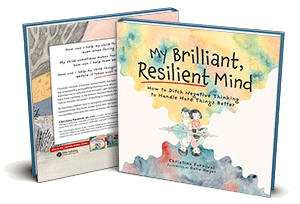Hi there! I’m Christina, a mom of three littles, a licensed mental health therapist, and a children’s book author! Thanks for checking out my site. Look around! I’m sure there’s something here for you! This guest post by Aja Chavez is about supporting a teen with anxiety.
A Parent’s Guide to Supporting a Teen with Anxiety
In my work with teens and their families, I’ve seen the profound impact anxiety can have on young lives—and how much parents can do to help.
It’s not easy to watch your teen struggle with anxiety, but with the right tools, you can be a steady source of comfort and guidance. Anxiety is common among teens, affecting up to 32% of adolescents, according to the Anxiety and Depression Association of America. Whether you’re just beginning this journey or looking for new ways to support your teen, here’s what I’ve learned from working with families like yours.
What Is Teen Anxiety?
Teenagers face a whirlwind of pressures—school, friendships, extracurriculars, and figuring out their identity. Anxiety goes beyond occasional stress; it’s a persistent feeling of fear or worry that disrupts their day-to-day life.
Symptoms of anxiety may include:
- Trouble concentrating.
- Restlessness or irritability.
- Physical symptoms like headaches or stomach aches.
- Avoiding social situations.
- Difficulty sleeping.
If you’ve noticed these signs in your teen, it’s time to take action.
Source: Why Teens Get Anxious: Understanding the Causes and How to Help
Supporting a teen with anxiety
1. Create a Safe Space for Communication
One of the most important things you can do as a parent is create an open and judgment-free environment for your teen to share their thoughts. Teens often feel hesitant to talk about their struggles because they fear being misunderstood.
Here are some strategies I’ve seen work well:
- Start small: Use low-pressure moments, like during a car ride or a walk, to bring up their feelings.
- Ask open-ended questions: Instead of “Are you okay?” try, “How has school been feeling for you lately?”
- Listen actively: Avoid interrupting or rushing to offer solutions. Sometimes, just being heard is enough.
2. Validate Their Emotions
Teens need to know their feelings are real and valid, even if they don’t make sense to you. Saying things like “It’s not a big deal” or “Just relax” can feel dismissive, even when your intention is to reassure them.
Instead, try phrases like:
- “That sounds really tough. I’m here for you.”
- “It’s okay to feel like this—lots of people do.”
Acknowledging their emotions helps build trust and shows them you’re on their team.
3. Teach Healthy Coping Skills
In my work, I’ve seen teens thrive when they’re equipped with the right tools to manage their anxiety. Every teen is different, so encourage them to explore a range of strategies:
- Physical activity: A short jog, yoga session, or dance break can work wonders for mental health.
- Mindfulness techniques: Deep breathing, grounding exercises, or apps like Calm can help calm their mind.
- Creative outlets: Art, journaling, or music can provide an emotional release.
- Time management: Helping them break tasks into smaller, manageable steps can reduce overwhelm.
One technique I often recommend is the 4-7-8 breathing method—inhale for 4 seconds, hold for 7 seconds, and exhale for 8 seconds. It’s a quick way to reset in moments of stress.
4. Identify and Manage Triggers
Many teens aren’t aware of the factors that worsen their anxiety. You can help them recognize and limit common triggers:
- Social media use: Encourage breaks to avoid unhealthy comparisons or online conflicts.
- Overloaded schedules: Work together to prioritize activities and avoid burnout.
- Lack of sleep: Teens need 8–10 hours of rest each night to regulate their emotions.
Helping them create a predictable daily routine can also reduce feelings of uncertainty.
5. Seek Professional Help When Needed
In my experience, families often wait too long to seek professional support, thinking they should handle things on their own. There’s no shame in asking for help—anxiety is highly treatable with the right resources.
Consider:
- Therapists: Cognitive Behavioral Therapy (CBT) is an evidence-based approach that’s particularly effective for anxiety.
- School counselors: They can provide accommodations or support at school.
- Pediatricians or psychiatrists: If anxiety is severe, they may recommend medication.
If you’re unsure where to start, a good first step is to ask your teen’s pediatrician for recommendations.
6. Model Resilience and Self-Care
Parents often underestimate how much their own behavior influences their teen. Teens are always watching, even if they don’t admit it. Show them how to handle stress in healthy ways by:
- Practicing mindfulness or relaxation techniques yourself.
- Talking openly about your own emotions (in an age-appropriate way).
- Setting boundaries to protect your well-being.
When you model resilience, you give your teen permission to do the same.
7. Build a Supportive Environment at Home
Teens with anxiety need a home environment where they feel safe and understood. Here’s how you can create that:
- Celebrate small victories: Acknowledge their efforts to manage anxiety, no matter how small.
- Foster connection: Spend time together doing activities they enjoy.
- Minimize conflict: Avoid intense arguments or criticism, which can escalate their stress.
Every positive interaction strengthens their sense of security.
8. Take Care of Yourself
Parenting a teen with anxiety can be exhausting, both emotionally and physically. It’s important to care for your own needs so you can support them effectively.
- Find your support system: Whether it’s a partner, friends, or a therapist, don’t go through this alone.
- Prioritize your health: Exercise, eat well, and get enough sleep.
- Set aside time for yourself: Even 10 minutes of quiet reflection can recharge you.
When you take care of yourself, you’re better equipped to help your teen.
9. Celebrate Progress
Anxiety doesn’t disappear overnight, but progress is something to celebrate. Pay attention to the small victories, like:
- Going to a social event they were nervous about.
- Speaking up in class despite their fear.
- Practicing a coping skill during a difficult moment.
Remind your teen—and yourself—that every step forward is a win.
FAQs About Supporting a Teen with Anxiety
- How can I tell if my teen has anxiety or is just stressed?
Stress is usually temporary, while anxiety lingers and interferes with daily life. Look for patterns like avoidance, sleep disturbances, or physical symptoms. - When should I seek professional help for my teen?
If anxiety impacts their ability to function at school, home, or socially, it’s time to consult a therapist or pediatrician. - How do I approach my teen if they don’t want to talk?
Give them space, but let them know you’re available. Sometimes, they may open up more easily to a trusted therapist or school counselor. - What if my teen refuses therapy?
Reframe therapy as a resource, not a punishment. Offer to explore options together, such as trying a different therapist or format like online counseling. - Can anxiety in teens be treated without medication?
Yes, therapy and lifestyle changes can be effective, but in some cases, medication may be helpful. Consult a healthcare provider for guidance. - How do I stay calm when my teen’s anxiety stresses me out?
Practice self-care, and consider joining a support group for parents of teens with anxiety.

About the Author
Aja Chavez serves as the National Executive Director of Mission Prep Healthcare, a mental health and addiction treatment organization dedicated to teens and young adults. With several years of experience in clinical program development and family support, Aja specializes in helping parents understand and address their teen’s mental health challenges. She has worked extensively with families, empowering them with tools to foster resilience and emotional well-being.



Such a helpful resource for navigating the challenges teens face. Open communication and understanding really do make a big difference in building trust.